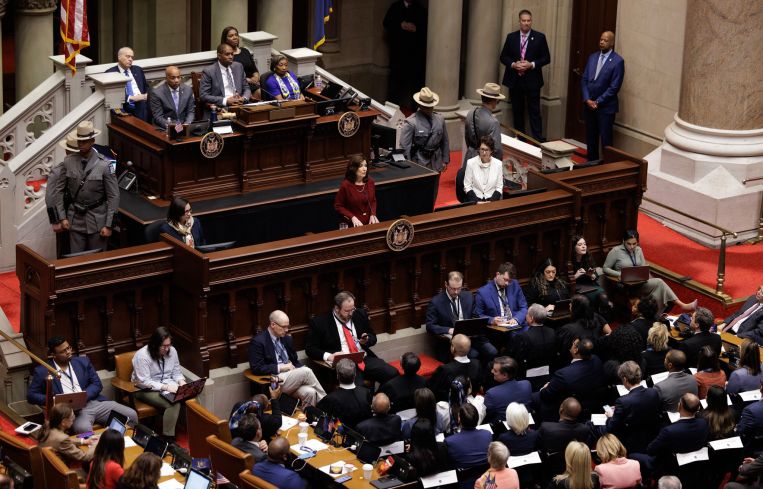A Frustrated Hochul Cedes New York’s Housing Future to Legislature
In her State of the State, the governor does pitch legalizing basement apartments, scrapping a cap on development density, and a city-made version of the 421-a tax abatement
By Aaron Short January 10, 2024 6:32 am
reprints
New York Gov. Kathy Hochul on Tuesday called the state’s housing shortage a “dire situation” that demanded “immediate action” but offered few solutions to address it while chiding the state legislature for failing to pass anything last year.
“Let’s be honest with New Yorkers: The only thing that will fix this problem is building hundreds of thousands of homes,” Hochul said Tuesday evening in her annual State of the State address in Albany. “Spending more money or insisting on new regulations will not get us out of the deep hole dug by decades of inaction.”
One year ago, Hochul proposed an ambitious package of housing bills that would have created 800,000 new homes over a decade. The measures would have mandated localities across the state increase their housing stock by 3 percent; changed zoning laws to allow residential units in vacant offices, basements and garages; and added a handful of tax incentives to spur construction of affordable developments.
But state lawmakers picked apart her proposals, forcing Hochul to abandon attempts to include them in the state budget. A last-ditch effort to renew a property tax abatement popular with developers known as 421a and enact other measures collapsed in June, prompting Hochul to issue executive orders to revive several stalled development projects in Gowanus, Brooklyn, in a limited pilot program that summer.
This year, the governor introduced a slimmed-down version of her housing compact that recycled a few ideas from 2023 and dared the legislature to figure out a solution on its own.
“I approach this crisis with the sense of urgency required. So what are we waiting for?” Hochul said. “Now is the time to act. New Yorkers are tired of waiting. I’m tired of waiting.”
If anything, the housing crisis has only gotten worse since early 2023. The average monthly rent in Manhattan peaked at an astronomical $5,588 in July, a Douglas Elliman report found, although it fell to $5,100 by the end of last year. Developers filed applications for a total of 9,909 housing units in New York City all of last year, half of the approximately 20,000 units per year produced between 2000 and 2020, according to a Real Estate Board of New York December 2023 report. (City and state leaders have set a target of 50,000 new units per year.)
“In recent years the governor has put forth a number of sensible housing proposals, but those ideas were not advanced by the legislature,” REBNY President Jim Whelan said in a statement. “We hope this is the year that state lawmakers help enact data-driven policies to address New York City’s housing supply crisis, as the situation will only worsen with further inaction.”
But it may be even harder to pass meaningful housing legislation this time around. Many lawmakers have balked at greenlighting any sort of tax abatements for developers, let alone linking them with measures they favor such as prevailing wage requirements for new affordable housing projects and stronger tenant protections. The governor, for her part, has refused to engage in any discussions about Good Cause Eviction, a bill that would cap rent hikes and prohibit landlords from removing tenants at will.
That could open the door for progressive lawmakers to make the first serious move in what are likely to be contentious negotiations over housing this coming session.
“I’ve said it before and I’ll say it again: Housing supply [goes hand in hand with] tenant protections,” Assembly Housing Chair Linda Rosenthal of Manhattan tweeted. “Looking forward to working with my colleagues and @GovKathyHochul to craft a holistic housing plan that addresses both the short- and long-term realities of New York’s housing shortage.”
What Hochul proposed
Hochul did outline a narrower path toward boosting housing supply in New York City.
Her four-pronged plan, which the Hochul administration outlined in a 180-page briefing book released the same day as the speech, included measures allowing city leaders to craft their own abatement to replace 421a while extending the deadline for completing existing projects eligible to receive the tax break. She also floated creating a new incentive for converting underutilized office properties to housing, removing a New York City cap on floor area ratio that will allow for larger buildings with a denser floor plan in some neighborhoods, and legalizing basement apartments to bring them up to code. Much of this would need legislative approval.
Hochul did offer, too, to allocate a $500 million capital fund in the state budget for developing 15,000 new units of housing on state-owned land such as former prison facilities, State University of New York campuses and lots next to regional rail stations.
But there were no details about how the conversion incentive, affordable housing abatement or the capital fund would be structured or what kind of dollar amounts would be attached to them.
“It’s a little light, and that’s surprising considering the tremendous need,” said Jay Martin, executive director of the Community Housing Improvement Program, a group representing owners of rent-stabilized properties. “There’s not a lot of detail and it seems as if she’s going to let the legislature take the lead on getting a package together. She has the ability to wrestle the bully pulpit away from the legislature, so it’s a little frustrating.”
What else made it
Hochul’s address Tuesday also included what she said were ways to ensure the health and well-being of New Yorkers, move people more safely and efficiently around the state, and reduce greenhouse gas emissions.
When Hochul was sworn into office in August 2021 after Andrew Cuomo’s resignation, the state began to emerge from the depths of a pandemic that exposed deep health disparities. This year, Hochul emphasized improving mental health among young people by promising to fund mental health clinics in any school that wanted one and expanding out-of-network coverage for therapy and addiction services.
“Make no mistake, this is the defining challenge of our time,” she said. “Focusing on our kids is everything. It’s critical. They’re our most precious resource.”
A rise in crime during the pandemic nearly cost Hochul a shot at a full term. After allocating $62 million to help the New York Police Department cover overtime costs to patrol the subway system last year, Hochul said she would give local law enforcement more resources to target retail thefts and crack down on unlicensed marijuana stores. She also said she planned to expand the number of offenses that qualify for hate crime prosecution.
Hochul didn’t forget about transportation. After touting the Interborough Express, a rapid transit project that would connect Brooklyn’s Sunset Park with Queens’ Jackson Heights, Hochul promoted expanding the Second Avenue Subway to West Harlem, which would involve bringing the Q line to Broadway and building three new stations at a cost of $8.1 billion. Hochul also vowed to pass Sammy’s Law, which would give New York City the ability to lower its speed limits.
Finally, the governor announced a climate agenda that would halt the expansion of new gas hookups, expand access to solar energy, and increase buyouts for coastal homes in flood zones.
What was left out
The governor avoided saying anything about immigration, despite Mayor Eric Adams’s hopes that the state would help New York City care for a growing number of asylum seekers.
Hochul officials said she would speak more about the migrant crisis in her budget address in the coming days, but some city officials called on the state to commit more resources for shelter and other services and defend their “right to shelter.”
“As in past generations, immigrants contribute mightily to New York City’s dynamism and economic fabric. The state must step up now to help,” City Comptroller Brad Lander said.
Child care advocates were disappointed that Hochul did not outline a proposal for universal child care for children under 5 or propose a living wage for child care providers, as the mayor has reduced funding for universal pre-K and 3-K child care programs in New York City.
Tenant protections also received short shrift from the governor, to no surprise. Housing advocates and lawmakers noticed. “Padding developer profits with tax breaks isn’t the only way to create the affordable housing New York so desperately needs. In fact, it’s a pretty inefficient way to do it,” Brooklyn Assemblywoman Emily Gallagher tweeted. “Stay tuned for a very different approach.”


